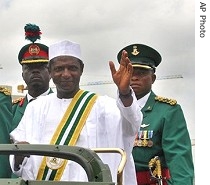2007年VOA标准英语-Some Former Nigerian Governors Under Scrutiny A(在线收听)
Dakar
07 June 2007
Former governors in Nigeria suspected of corruption have showed up in Abuja for a meeting with an anti-corruption body, but several others are on the run. The government of new President Umaru Yar'Adua has vowed to stamp out corruption, but some opposition leaders say only political opponents are targeted. Selah Hennessy reports from the West Africa bureau in Dakar.
 |
| Umaru Yar'Adua, 56, waves to supporters after he is sworn in in Abuja, 29 May 2007 |
Nigerian media said at least ten met with Nuhu Ribadu, the chairman of the EFCC on Wednesday. Details of the meeting are not known. None of the former governors was detained following the discussion.
The anti-graft agency was set up by former president Olusegun Obasanjo in 2001 to purge the country of official corruption.
Tunde Martins, a political analyst in Nigeria who has been advisor to previous governments, says he believes the EFCC is doing well in its fight against corruption, despite persistent criticism.
"I can tell you that the commission has largely helped to not only sensitize Nigeria on the need to fight corruption, they have also succeeded in fighting corruption head on," he said.
Martins says he disagrees with the often-made accusation that the Commission is a political tool used by the government to intimidate political opponents.
"I am not impressed with some comments of people who try to say that the EFCC has been fighting political enemies of the government," he added. "So long as it has been confirmed that they were arrested for stealing public funds there is no need to bring politics into it."
A Nigerian journalist says that new president Umaru Ya'Adua is cautious not to appear to be using the EFCC for political gain now. He says this is why the EFCC did not arrest and publicly humiliate the former governors, as was sometimes done under the former president.
Damka Pueba is based in Abuja for the non-profit organization Stakeholder Democracy Network. She says the outcome of this investigation will have huge repercussions for the future of corruption in Nigeria.
"This is a very significant step that the EFCC is taking and Nigeria is actually watching," she noted. "The way that this investigation goes is really going to impact negatively or positively in terms of the way that the new government behaves."
She says she is impressed with the recent developments made by the EFCC, but that in the past the government and EFCC have talked a lot about fighting corruption, but done little.
"We have reached the point in this area where a lot of things are said, but when it comes to implementation we find something different happening," she explained. "If the governors are actually brought to book it will be a deterrent factor to this new government, governors that are in place, that when you are in office, if you do not perform well, if you make money from the people, when you leave office you have the people to answer to."
The EFCC says it wants to investigate most of the 36 governors who left office last week after serving during the presidency of Mr. Obasanjo's. Under Nigerian law, they enjoyed immunity from arrest while in office.
But at least four are on the run, having left the country before turning over power in inauguration ceremonies last week. One outgoing governor organized a transition of power several days ahead of schedule.
EFCC chairman Ribadu says it will be difficult for the commission to bring the runaway former governors to justice, as it does not have jurisdiction outside of Nigeria.
The EFCC says that Nigeria's military governments squandered around $400 billion over the course of 40 years.